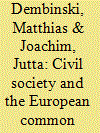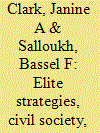| Srl | Item |
| 1 |
ID:
134066


|
|
|
|
|
| Publication |
2014.
|
| Summary/Abstract |
The involvement of civil society organizations (CSOs) is widely regarded by students of the EU's domestic policy fields as enhancing transparency and accountability and, more generally, the democratic quality of political processes. This article explores the contribution of CSOs to the EU's Common Security and Defence Policy and assesses whether a democracy-enhancing effect of their involvement can also be demonstrated for this policy field. We analyse the contribution of CSOs based on two common models of democracy: the intergovernmental and the supranational model of democracy. We find that CSOs are indeed quite actively involved in the EU's security policy. With regard to their democracy-enhancing effects, however, our findings are rather mixed. While the engagement of CSOs does provide a remedy for the democratic deficits associated with intergovernmental decision-making, these organizations do not fully meet the demands posed by supranational governance.
|
|
|
|
|
|
|
|
|
|
|
|
|
|
|
|
| 2 |
ID:
124480


|
|
|
|
|
| Publication |
2013.
|
| Summary/Abstract |
This article explains the endurance of sectarian identities and modes of political mobilization in Lebanon after the civil war. This is done by examining three case studies that demonstrate a recursive relation between sectarian elites and civil society actors: on one side of this relation, sectarian elites pursue their political and socioeconomic interests at the expense of civil society organizations (CSOs); on the other side, civil society actors instrumentalize the sectarian political system and its resources to advance their own organizational or personal advantage. These mutually reinforcing dynamics enable sectarian elites to penetrate, besiege, or co-opt CSOs as well as to extend their clientelist networks to CSOs that should otherwise lead the effort to establish cross-sectarian ties and modes of political mobilization or that expressly seek to challenge the sectarian system. The article fills a gap in the literature on sectarianism in postwar Lebanon and helps explain a puzzle identified by Ashutosh Varshney in the theoretical debate on ethnic conflict, namely the reasons behind the "stickiness" of historically constructed ethnic identities
|
|
|
|
|
|
|
|
|
|
|
|
|
|
|
|